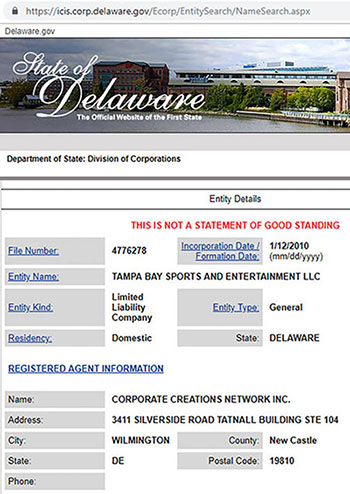
Tampa Bay Lightning owner Jeff Vinik has violated Florida law every year since he purchased the team by not registering the out-of-state corporation that owns the team with the State of Florida. In doing so, Vinik has escaped paying annual fees and avoided meeting required disclosures.
Vinik is the chairman and sole individual controlling the corporation.
The Tampa Bay Lightning is owned by a Delaware corporation called Tampa Bay Sport and Entertainment, LLC (TBSE). When the National Hockey League announced the sale of the Tampa Bay Lightning Feb. 5, 2010, TBSE was mentioned by name as the new owner. TBSE is thus a Delaware corporation that transacts business in Florida.
Incorporating in Delaware instead of Florida makes TBSE a “foreign corporation” under Florida law. Florida Statute 607.1501 states that “a foreign corporation may not transact business in this state until it obtains a certificate of authority from the Department of State.”
However, since purchasing the Lightning, TBSE never obtained the required certificate from the state. The Guardian confirmed this through a phone call to the Florida Division of Corporations.
 Other foreign corporations large and small, like General Electric, ExxonMobil, Microsoft, Apple, McDonald’s, and even Whataburger, all have registered as foreign corporations. Vinik’s TBSE has not.
Other foreign corporations large and small, like General Electric, ExxonMobil, Microsoft, Apple, McDonald’s, and even Whataburger, all have registered as foreign corporations. Vinik’s TBSE has not.
Florida Statute 607.1502 specifies the penalties and consequences for such failure to register. The financial costs may be as high as $15,000, but that’s pocket change to TBSE and Vinik. Instead, an important question is, what information was withheld as a result?
Had TBSE registered as a foreign corporation, it would have had to fill out a form disclosing all its officers and all directors. It would also have had to disclose its street address, something Delaware does not require.
A street address can provide important information, as Jim Bleyer showed in his weekend story in Sunshine State News. That bombshell article revealed an important but previously undisclosed TBSE business activity.
Had TBSE complied and registered as a foreign corporation, it also would have had to update the state about who its current officers and directors are by filing an annual report. By not filing, it has avoided doing so for nine years.
Apple filed such an annual report last month. Microsoft did so this month, and in its filing, Microsoft disclosed over 200 officers and directors.
Even less well-known companies with a tiny Florida footprint complied as Vinik did not. For example, the direct-to-consumer makeup company Glossier registered as a foreign corporation with Florida on Dec. 7 last year. Like TBSE, Glossier is also a Delaware corporation. Its only business in Florida that requires registration is a pop-up store in Miami. That store is only open from March 26 to May 5 this year.
Fifty-nine-year-old Vinik has a B.S. in civil engineering from Duke and an Master's from Harvard Business School. Emily Weiss, the 34-year old founder and CEO of Glossier, has B.A. in Studio Art from NYU and no Master's. But Vinik and Weiss do have one thing in common: They were both born on March 22.
Emily Weiss

In contrast, Glossier received no public handouts or favoritism from elected officials.
Vinik even managed to get the Tampa Port Authority to provide $1.7 million when one of his companies bought Channelside Plaza, now renamed Sparkman Wharf.
Jeff Vinik

As a result of nine years of non-disclosure, the public is left in the dark about who benefits as Vinik seeks larger and larger tax subsidies from local government. Are elected officials benefiting financially? Who has benefited in the past? The public has no way of knowing because it hasn’t been provided the information that by law it is entitled to.
As the lines blur between business and government, between the Tampa Bay Times and Vinik, the ancient question cui bono comes to mind. Who benefits from these blurred lines and from Vinik’s flouting of clear disclosure requirements? One group we can be sure does not benefit is the taxpayers.
Tom Rask is publisher of the online Tampa Bay Guardian. This story first was edited for use in the Tampa Bay Beat.


